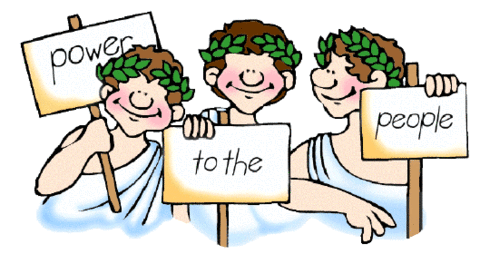How Elections Hurt Our Democracies
Representative democracy began thousands of years ago in the Roman Republic. The Romans favored this system over the direct democracy of the Greeks, for good reason: being bigger than the Greek city-states, it was impractical to have everyone vote on every issue. Also, it made sense for the richest and most educated people to be elected senators, as they best understood societal issues and could make the best decisions for the population.
However, representative democracies in the modern world have run into many problems. Representatives tend to prioritize re-election above most other aspects of their agenda and feel obligated to serve their constituency only when it benefits this outcome. This creates marginalized minorities, dishonest politicians, and gives the rich an unfair share of power, problems that have led to a plummeting in voter turnout around the world.
Current democracies are flawed in multiple ways. First, they always result in someone’s alienation. In the U.S., for example, elections are held in a winner-takes-all, “first past the post” style. If Florida elects a Democrat senator by 51% to 49%, the opinions of 49% of the state are ignored. Even in proportional representation systems, where seats are allocated based on the proportion of votes a group receives in a general election, interest groups still need to pass a threshold to gain a seat at all. In Germany, for example, a party needs 5% of the vote in the general election to receive a seat in parliament; any party with less is marginalized.
Second, representative democracies suffer from a lack of accountability. Politicians in the modern world are making politics a career; they cater their messages to whoever is listening, be it the masses or wealthy donors, in order to secure re-election. Those who do not seek re-election are even worse in that they can ignore all their campaign promises. For example, Abdala Bucaram, former president of Ecuador, made promises as wonderful as supplying every mother with daily bottles of fresh milk while running for election. Upon becoming president, he embezzled millions from the state treasury and laughed at citizens for believing his unkept promises. No matter how much candidates’ backgrounds are scrutinized, the risk of people joining politics for personal gain are always existent.
Finally, in many modern democracies, the poor do not have the same influence in government as the rich do. This is especially a problem in countries with high wealth inequality, because the poor may lack the resources such as television and the internet to keep up with the latest political decisions. Thus, their interests are easily drowned out by big money interests. In the U.S., for example, corporations and interest groups spent $2.6 billion lobbying last year. With so much incentive to favor big businesses and cash-laden groups (such as the National Rifle Association), it is no surprise the interests of those without money are neglected. At the same time, representatives are also vulnerable to corruption. In Brazil, for example, the petroleum company Petrobras was caught spending millions bribing government officials. Even Brazilian president Dilma Rousseff is allegedly involved. Representatives will always be targeted by those with money because of the positions of authority they hold.
The distance between voters and legislation has caused a growing sense of disillusionment in many modern-day democracies. Participation rates in representative democracies have never been lower, as poor people realize there is little they can do to change status quo. Voter turnout rates in established democracies have dropped from 80% in the 1950s to lower than 60% now.
If things are so horrible, is there an alternative? Possibly. In a direct democracy, citizens vote directly on the issues. The people retain all authority by cutting out the middle man. All of the problems listed above – problems inherent with modern democracies – are solved. Since there are no representatives to target, there is no corruption. At the same time, because a direct democracy essentially makes the population into one giant parliament, (where every citizen votes on legislation instead of a few select senators) no one’s interests can be ignored. Minority groups that struggle to get a single seat in modern parliaments will be able to participate fully in the government.
Implementing a direct democracy is difficult, however. Athens, the first democracy, was originally a direct democracy. Its system was dropped later in history because of mechanical reasons: the populace was getting too big and the issues too complex to have everyone participate. These issues hinder direct rule by the people to this day.
Technological advances and globalization are making the direct democracy more feasible, however. Social media has made it easy for people to become educated about politics. People can learn, discuss, and vote, all from the comfort of their homes. A US citizen might learn about the latest national issue from CNN and read in-depth analysis of the potential consequences of a political decision on the New York Times. Thanks to the availability of information, the world has never had an electorate as educated as the modern-day electorate, and this trend will only increase as technology is further dispersed around the world. The argument that the masses do not know what is good for them and need to be ruled by the educated is no longer valid.
Some may argue that, to have an effective democracy, citizens need to invest hundreds of hours every year to vote responsibly on issues. The internet, however, has voting on a regular basis possible. Imagine yourself logging in to a voting website on Sunday, either by entering a password or scanning your fingerprints. You quickly glance through the weekly round legislations before voting on the ones that interest you. If your schedule is busy, you can vote as your favorite political party advised you to vote. Devoid of authority, these new parties leave big-money interests behind and compete for “subscribers” by presenting the most streamlined, yet logical, advice for how you should vote. In the modern world, people can fulfill their civic duties in minutes.
A prototype for the direct democracy already exists in Switzerland. The Swiss government’s foundation is its use of public referendums. Its Constitution holds that important issues, such as the joining of external organizations, revisions to the constitution, and treaties, must have a nationwide referendum to pass. Legislation with a validity that exceeds one year also needs a referendum.
While Switzerland does still have an elected parliament, these representatives act more as public servants than figures of authority. Their job is the scan through the issues Switzerland face and decide which are the most urgent for the Republic to consider. Ultimate decision power remains with the citizens. For example, the Swiss can propose any change to the constitution if they gather 100,000 votes, and demand a referendum on any law if they gather 50,000 votes. With a population of 8 million and a literacy rate of 99%, the Swiss make these educated decisions with ease.
True, Switzerland is small, and not every country has an average five-hour work day. But social trends are undeniably making direct democracy feasible around the world. In April, the people of Sudan’s Darfur region voted to unite its five states into one entity. This June, the UK will hold a national referendum regarding membership in the EU. Countries around the world are giving authority back to the people. It is only the most important, national issues for now, but a future where all authority are given to citizens may not be far off. Let’s let modern needs and technology converge to make a truly democratic nation.
Featured image source: ideasmakemarket.com






Be First to Comment